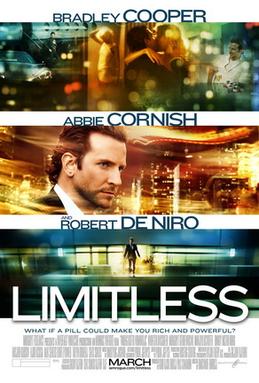Limited
 - What if a pill could deliver the American Dream of immense success to you on a silver platter? In today's society that demands instant gratification and results, the idea of a pill that could make our lives better in every area sounds very appealing. When broke, washed-up and altogether ambitionless writer Eddie Mora (Bradley Cooper) gets the chance to try an experimental pill, a drug called NZT, that would allow him to use 100% of his brain, instead of the 20% norm, he jumps at the chance. The pill works better than he could have imagined, allowing Eddie to finish his book and become a star on the stock-trading stage. But on his way up on Wall Street, Eddie comes crashing down in a sea of danger as powerful people try to kill him before drug dependence does.
- What if a pill could deliver the American Dream of immense success to you on a silver platter? In today's society that demands instant gratification and results, the idea of a pill that could make our lives better in every area sounds very appealing. When broke, washed-up and altogether ambitionless writer Eddie Mora (Bradley Cooper) gets the chance to try an experimental pill, a drug called NZT, that would allow him to use 100% of his brain, instead of the 20% norm, he jumps at the chance. The pill works better than he could have imagined, allowing Eddie to finish his book and become a star on the stock-trading stage. But on his way up on Wall Street, Eddie comes crashing down in a sea of danger as powerful people try to kill him before drug dependence does.Ignoring for a moment that the "10% myth" (in this case, the film suggests the figure is 20%) has not been laughed at and disproved by scientists.... OK, I can't ignore it! The main idea in which the plot swivels upon - that people do not already use 100% of their brains on a daily basis - is pretty ridiculous and it is difficult to base a thoughtful plot on a fallacy. But the affects that NZT has on Eddie's life make for a good story and, thanks to this interesting aspect of the plot as well as some competent direction, Limitless (2011) is a marginally entertaining film based on Alan Glynn's novel The Dark Fields.
The story has a few problems but the specific ways that the side effects of NZT play out in Eddie's life are quite interesting; everything he could possibly want comes true when he is able to basically do anything he wants to anybody - but he faces the consequences for his actions as well.... To a point.
****SPOILERS HERE!!****
The ending really rubbed me the wrong way. While Eddie is briefly met with some potentially life-threatening responses to his actions throughout the film, very little character development occurs. He is supposedly able to use 100% of his brain but never really seems to learn anything! Rarely does morality factor into his actions or reactions and when it does, it quickly recedes into.... What? The one brain cell that he is not using, I suppose? This could have been part of the idea behind the theme of the film, except that the film seems to hint at the opposite: everything ends up working out for good 'ol Eddie by the time the credits begin to roll - never mind that he is permanently hooked on NZT, dedicating his life towards great power over others and gratification for his own selfish desires and gaining enemies left and right. I guess the drug worked out after all, to the point where he gets a very twisted Walt Disney ending! This is wrong on a very important level. Even if a character remains a morally repugnant character at the end of the film, it is supposed to at least register with the character that his life has been ruined or that he is at least a bad person who must limp on through the consequences that he has carved out for himself (i.e. the end of The Godfather Part II (1974)). Anything else feels disingenuous.
****END OF SPOILERS****
Anyway, what ultimately made Limitless watchable for me was the specific visual work of director Neil Burger (The Illusionist (2006)). Burger usually directs *and* writes his films but Limitless is the first film that he has simply directed. Clearly not as strong a film as the incredible The Illusionist (perhaps because Burger had no significant work on the development of the screenplay for Limitless), Burger does an impressive job crafting the visual aspect of the film. Employing a snazzy style and a lot of cinematic tricks to enhance the audience's perception of NZY, Burger effectively allows the audience to feel the effects of the drug through the visuals. No special CGI effects are required - just some old fashioned inventive filmmaking. Unfortunately, where he excels as far as style goes, Burger was unable to bring his cast to a similar high level. I am just not a big Bradley Cooper fan (he is better than the original choice of Shia Labeouf though!). Cooper, with his shallow and cocky demeanor, works OK in things like The Hangover (2009) and The A-Team (2010) but really fails to convince when portraying a character grappling with anything serious. Abbie Cornish and Robert De Niro are pretty boring in their supporting roles; the character that Cornish portrays could have been played by any actress that can speak English and De Niro is simply coasting along as usual, having not given a good performance since Ronin in 1998. So although I was significantly disappointed by Limitless, I hope to see more from a clearly talented Neil Burger.
CBC Rating: 6/10
No comments:
Post a Comment